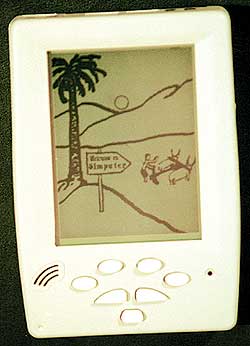 BANGALORE - The first assignment of a poor man's hand-held computer, developed in this global IT hub, is to bring basic education to tribal children in central India.
BANGALORE - The first assignment of a poor man's hand-held computer, developed in this global IT hub, is to bring basic education to tribal children in central India.
At $200 apiece, the Simputer, when first developed and launched late last year by four professors at the prestigious Indian Institute of Science (IISc) here, was hailed for its major price breakthrough and touted as the answer to the digital divide that puts technology beyond the access of poorer people.
The Paris-based charity South Asia Foundation (SAF) has roped in the creators of the Simputer and digital broadcaster, World Space radio, for the device's first field application-an interactive education programme for rural children in the remote Bastar district of central Chattisgarh state.
PicoPeta Simputers, a company launched by the coalition, will be funded by the Rainbow Partnership Organisation, an SAF initiative that promotes cooperation among the seven members of the South Asian Association of Regional Cooperation (SAARC).
SAF is the brainchild of veteran Indian diplomat and adviser to the UNESCO, Madanjeet Singh. "Our pilot project in Bastar is expected to benefit about 2,000 students," says Professor Swami Manohar, the acting chief executive officer PicoPeta Simputers. "It will be operational in six months."
Already, the new company has tied up with public sector giant Bharat Electronics Ltd to produce about 100 Simputers that will be used to receive digital content broadcast by WorldSpace, which has been broadcasting digital data along with its popular voice broadcast of news and entertainment. At present, only commercial organisations download World Space broadcasts using personal computers. "Personal computers tend to use up a lot of disk space to store voice files. But the text-to-voice capability of the Simputer makes the process easy,' notes Professor Ramesh Hariharan, the youngest of the IISc Fab Four, as the local media calls them. "It is interactive and easy to operate, thus enhancing the effectiveness of education programmes," says Hariharan.
Fending off criticism that high-technology was being foisted on schools that still lack blackboards and buildings, Hariharan argues that the Simputer can bridge the digital divide in a creative way. Together, they can make available professionally designed lessons to the most far-flung village that have no telephone or electricity, he explains.
Hundreds of villages in southern Karnataka state, of which Bangalore is the capital, lack electricity or telephone connections and can greatly benefit if the interactive education in Bastar takes off. Smart cards are used to personalise applications in a Simputer. These detachable credit-card-like devices will function as blackboards, notebooks and report cards in the Bastar education project. Each student's smart card will enable her, her teachers and the course designer to monitor the progress of lessons studied. This will even enable students at non-formal education programmes to study at their own pace and according to their ability.
"Once the Simputers are in place, the villagers can use them for other purposes such as microcredit facilities, storing and accessing agricultural data and so on," says Professor Vijay Chandru, director of PicoPeta Simputers. Simputers are adaptable to a large range of rural applications. With the smart card, they can function as an effective aid to facilitate village census, agricultural data collection, and even routine services such as railway ticket reservations.
The professors will also help to develop the content for the education project. "First and foremost we are teachers. Together we have 35 years of teaching experience," Manohar says. "What we envisage is a set of software tools adaptable for a wide range of teaching applications," explains Chandru.
A major hurdle for the Simputer has been getting enough venture capital or corporate tie-ups to start commercial production. Help from two \'angel' funders took the project through the prototype phase.
One of the factors that could discourage commercial tie-ups is the unique open-licensing procedure of Simputer. It works on the public-licence Linux operating system. PicoPeta Simputers has another problem. (IPS)


